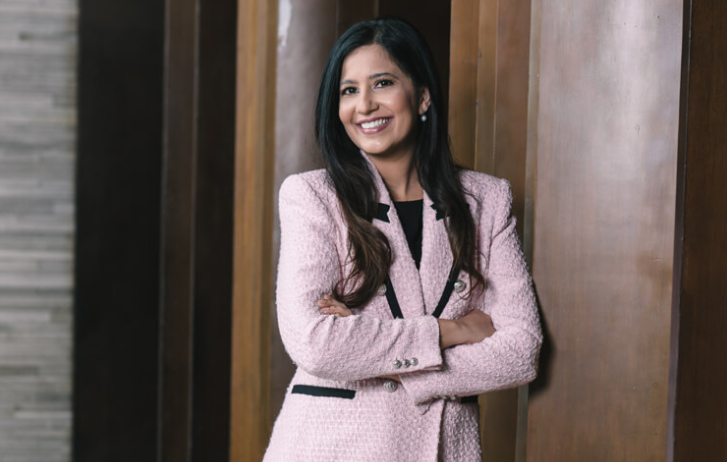
Scaling For Success: How This CEO Built An Empire With Content
By FedEx | March 27, 2024
Roshni Mahtani Cheung’s parent-tech company The Parentinc connects parents in Southeast Asia with the content, community and products to help them raise happy, healthy families. In this interview, she talks about her unique business model, the challenges she faced expanding the company, and her advice for aspiring CEOs.
Picture this: you’re a new or soon-to-be parent, looking for advice or resources on a host of topics. You also need to shop for family products, preferably from local brands. The founder of parent tech company The Parentinc saw an opportunity to connect all these needs and more, building an online community (theAsianparent, now with over 25 million users a month across Southeast Asia) from scratch.
Today, The Parentinc has added brands, such as direct-to-consumer pregnancy brand Mama’s Choice, Vietnam’s biggest social network for women Webtretho, and omnichannel retailer motherswork as well as its D2C baby brand Little Rei, to its portfolio.
We spoke to Singapore-based CEO and founder Roshni Mahtani Cheung to find out what it’s like juggling multiple business units at once, what ventures haven’t panned out, and how she earned her first million in annual revenue.
The Parentinc has opened multiple business units, spanning retail, distribution, market research and content creation. How do you make sure you expand your company at a smart, sustainable pace?
Roshni: I’ve always had an ambitious streak, so I can’t say that I haven’t bitten more than I could chew. We used to publish women’s verticals outside of parenting but decided to stick to parenting. We previously launched in markets outside of Southeast Asia that we’ve now shut down, and developed mum and baby products that we don’t manufacture anymore. While the temptation to diversify and expand rapidly can be strong, I’ve learned to take a more measured, thoughtful approach.
We previously launched in markets outside of Southeast Asia that we’ve now shut down, and developed products that we don’t manufacture anymore.
These experiences have taught me invaluable lessons. The decision to concentrate on pregnancy and parenting over a broader spectrum of women's topics was to make sure we align our offerings with our core competencies. Our experience entering markets outside of Southeast Asia that didn't prove viable highlighted the need for thorough market research and a deep understanding of local dynamics before expansion.
Developing products that are no longer part of our manufacturing portfolio emphasized how important it is to stay agile, respond to market demands, and regularly reassess our product strategy.
While my ambition remains a driving force, it is tempered with a newfound appreciation for the value in strategic restraint. We have to ensure that each step forward aligns with our long-term vision and capabilities.
You’ve spoken about your “content to community to commerce” business model. Why do many companies struggle to find success adopting this model? What did The Parentinc do differently?
We invested significant time and resources to understand our target audience within the parenting niche. We knew it was important to get insights into the needs, preferences, and challenges of the community.
Content is at the core of this model, which we started with our flagship brand, theAsianparent. Our goal was to consistently deliver valuable information and resources that addressed our audience’s concerns. This way, we established trust and credibility in our platform, and built a robust community.
Besides providing valuable content, we facilitated discussions, encouraged user-generated content, and created a sense of belonging. This community engagement fostered customer loyalty.
Thanks to our content platform and loyal community, our traffic, engagement and audience insights about online behavior gave us the ability to develop products under our D2C brand, Mama’s Choice, that complemented the content and community elements. We could seamlessly integrate our products into the platform without having to resort to aggressive sales tactics.
When you first started out with The Parentinc, what strategies did you use to help your company hit its first million in annual revenue?
We started out as a publishing company with theAsianparent as our flagship brand. So we had to make sure that we had a solid product to sell, that our website received high volume traffic, our content ranked first page on SERPs, and we had a highly engaged community.
But beyond establishing a formidable online presence, our journey to achieving our first million in revenue was significantly shaped by the relationships we cultivated with our clients.
Recognizing the importance of client satisfaction and trust, we prioritized open communication, attentive listening, and a genuine commitment to understanding their unique needs.
Our client-centric approach went beyond mere transactions. It involved forging true partnerships. Regular feedback sessions, personalized interactions, and a proactive stance in addressing their concerns not only enhanced the overall client experience, but also solidified our reputation as reliable and customer-focused.
What is one belief you hold that other business leaders might disagree with you on?
Many leaders advocate for more structured processes and a focus on efficiency and consistency. I champion a culture of unbridled creativity, emphasizing the importance of fostering a dynamic and innovative environment.
I believe that giving employees the freedom to explore new ideas, take risks, and challenge the status quo is essential for driving breakthrough innovations and maintaining a competitive edge in a rapidly evolving industry.
That’s why we issue “F*ck Up” cards to our employees—to encourage them to think outside the box. If things don’t go according to plan and they make a mistake, they can use this as their get out of jail free card.



Describe the greatest business failure that you treasure the most.
I really thought that we could succeed by launching in India back in 2015. India was a huge market, and still is, for the mother and child sector. We ran theIndusparent for over three years, pouring resources into building a local team, localizing content, building community engagement, and tailoring our offerings to the unique needs of the Indian audience. Despite our best efforts, we faced challenges that we had underestimated - one being the existing competitors that already had an iron grip on the market.
The experience reinforced that success in one market does not guarantee a seamless transition to another, even within the same industry sector. I apply the lessons learned from our foray into the Indian market to any future expansion strategies.
What is the biggest challenge you face as a female CEO?
Being young, female, and Asian – that’s a trifecta for a hard journey ahead. I started my company when I was 25 years old and people didn’t take young Asian women seriously back then. I went to meetings with 40-something male business owners who couldn’t look me in the eye and would direct their questions to junior male employees instead.
Being young, female, and Asian – that’s a trifecta for a hard journey ahead.
I’m now 40, and I still face similar blockers because of my gender or the concerns of the community I cater to. Discussing sensitive topics like breast engorgement and nipple soreness due to breastfeeding remains a big hurdle. I once tried to talk to an investor about our best-selling nipple cream, and he didn’t let me continue because he felt uncomfortable.
The biggest challenge, in truth, is being heard. Despite the progress we've made, breaking through stereotypes and societal discomforts continue to be a challenge. It's not just about overcoming gender biases; it's about getting the crucial discussions on women's health and parenthood to be taken seriously. As we continue to push boundaries, my hope is that the value of our message will resonate louder than any preconceived notions, fostering a more inclusive, open-minded business landscape.



What is your best advice for women aspiring to become a leader or manager?
Stepping outside your comfort zone is often where the most significant personal and professional growth occurs. Be proactive in seeking opportunities for growth and advancement. Don't shy away from challenging assignments or leadership roles.
Don't let the fear of failure hold you back. Rejections and moments of discomfort are inevitable, but they should not deter you. Stay resolute in the face of setbacks, displaying tenacity and determination. Understand that failures are an inherent part of the journey to success. Instead of allowing them to discourage you, view failures as valuable lessons that propel you forward, contributing to your continuous growth and resilience.
What’s next for The Parentinc?
With The Parentinc's recent acquisition of motherswork, a new chapter is unfolding. Our focus is on expanding our footprint in retail and distribution, as we aim to solidify our position as industry leaders in the mother and child sector both online and offline. Our next step is opening a new motherswork store in Vietnam, which we will use as our entry point to introduce Mama’s Choice products to the market.
***
In our Confessions of a CEO column, Asia’s entrepreneurs and business leaders share insights for small businesses across the region. To read more entrepreneurship stories like Roshni’s, subscribe to our monthly newsletter below, and keep your eyes peeled for the next edition.
SHARE THIS STORY
- How To Ship A Giant Panda
- How To Make Freight Shipments Work For Your Small Business
- The Rise Of Intra-Asia Trade: Opportunities In The China-Southeast Asia Corridor
- Southeast Asia: The Next Manufacturing Powerhouse?
- 8 Most Unusual Shipments In The History Of FedEx
- Where Do Old Planes Go When They Retire?
Sign up now and save on your shipping rates!
Sign up now and earn discounts by shipping instantly with FedEx Ship ManagerTM at fedex.com.
Recommended For You

Plinkit’s CEO Is On A Mission To Make Parenting Simpler
Charmaine Pattinson is the CEO of Plinkit, a leading online child development resource for intentional parents and educators.
Read More
4 Ways SMEs Can Build More Sustainable Communities
Small businesses play a vital role in driving growth and innovation throughout Asia Pacific and globally. Here’s how they can contribute.
Read More
How To Measure Impact For An Inclusive, Sustainable World
Economic, societal, and environmental impact: we call it the “FedEx Effect.”
Read More


